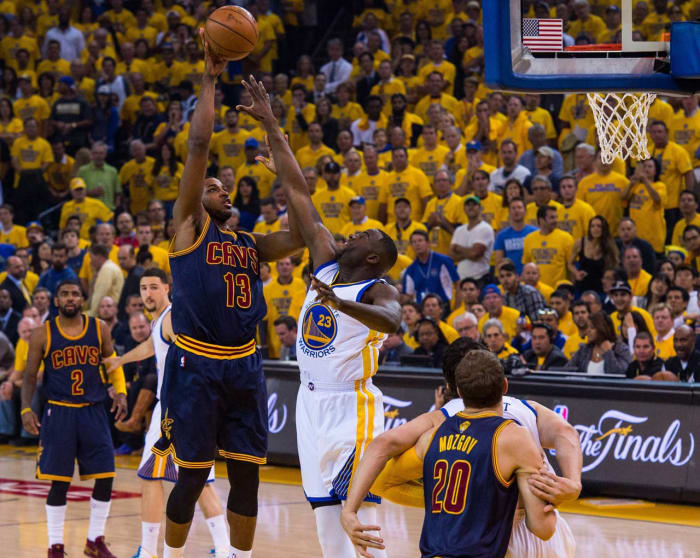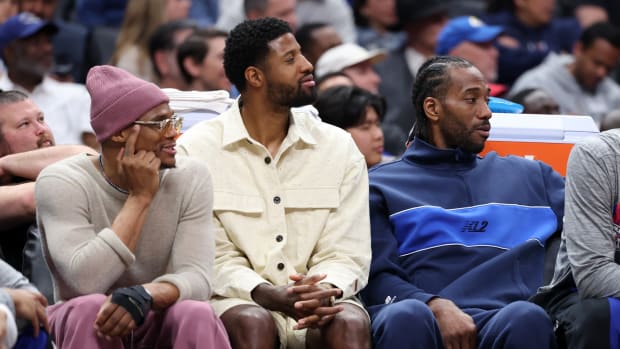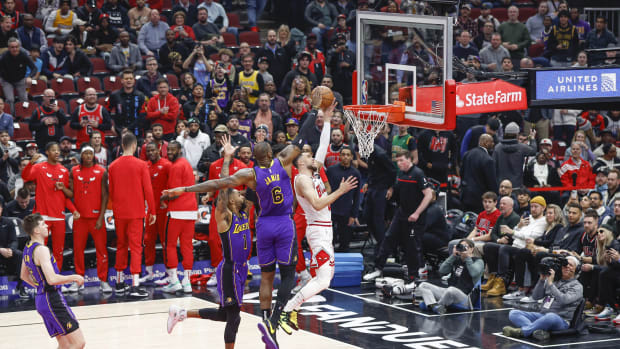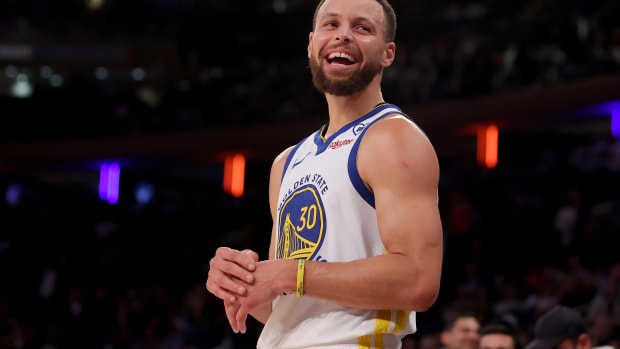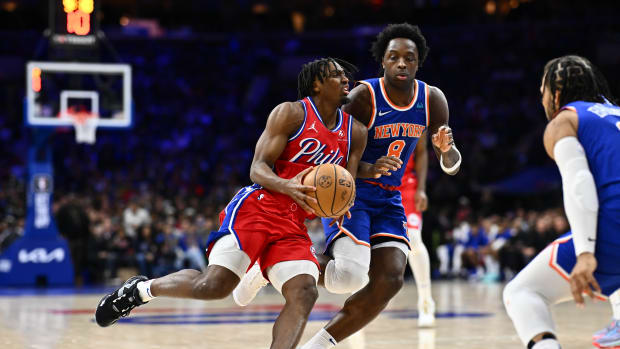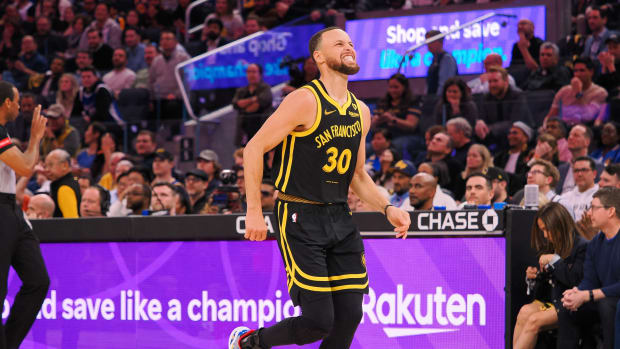LeBron, Cavaliers face daunting Finals challenge without Kyrie Irving
OAKLAND, Calif.—The Cavaliers could scan the skyline with a pair of binoculars in one hand and a telescope in the other and still not find a silver lining to Kyrie Irving's season-ending knee injury.
Friday's news that Irving will undergo surgery to address a fractured left kneecap that he suffered in overtime of Game 1 hit hard in so many ways. For Irving, it spoiled not only a great night's work, but also wasted weeks of managing various maladies during this postseason run. For LeBron James, it made this challenging series against the Warriors that much more daunting, as it stripped him of his most dependable shotgun scoring option. For coach David Blatt, it meant another huge void to fill with a bench that was badly outplayed Thursday. For Cleveland, a sports city defined by its misery, it meant one more spin through the torture chamber. For the NBA, it meant that a scintillating Finals opener was immediately lost in hand-wringing over yet another injury to a superstar player.
No silver lining. Just rotten repercussions in every direction.
Nevertheless, the games must go on, and the Cavaliers must quickly refocus after losing Game 1 and Irving. Although it hardly counts as a comforting thought, Cleveland is at least well-prepared for calamity. Already this season, Blatt and company have made due without Anderson Varejao, Kevin Love and Irving, who was limited in the second round against the Bulls with a foot injury and who sat out half of the Eastern Conference finals against the Hawks with knee tendonitis. Making adjustments on the fly has been the status quo since January, when multiple trades reshaped the roster, and the defining characteristic of the Cavaliers' postseason, other than James's dazzling play, has been an impressive resolve in the face of adverse conditions.
Oracle Arena brings the noise for an NBA Finals worth screaming about
Blatt's first step in replacing Irving will be to promote reserve guard Matthew Dellavedova to a starting role, as he did in Games 2 and 3 against Atlanta. Dellavedova, 23, went undrafted in 2013 after spending four seasons at St. Mary's, and he's perhaps best known for his role in a series of altercations during the playoffs. In the second round, Dellavedova locked Taj Gibson's leg between his own legs while laying on the ground, leading the Bulls forward to kick him and earn an ejection. Against the Hawks, Dellavedova dove for a loose ball and landed on Kyle Korver's ankle during Game 2. Korver would later undergo season-ending surgery as a result on the play. One game later, Dellavedova became entangled with Al Horford during a rebounding scrum. Thinking that Dellavedova was attempting to fall onto his knees, Horford intentionally elbowed the Australian guard in the head, earning an ejection.
• MORE NBA: Why LeBron isn't winning title | Postgame reaction to Irving
After Game 3, multiple members of the Hawks suggested that Dellavedova had a "track record" of incidents, although they stopped short of outright calling him a dirty player. In response, Dellavedova denied any intent, saying he was "pretty annoyed" by the talk that he was dirty, and James went out of his way to stand up for his teammate, praising Dellavedova's hard-nosed style of play.
There is more to Dellavedova's game than this string of incidents, even if he lacks the elite athleticism Irving displayed by finishing beautifully in traffic or blocking Stephen Curry from behind in the last minute of regulation in Game 1. His primary job on offense is to spot up on the arc, feasting on kick-out passes or cross-court looks from James. Dellavedova shot 40.7% from deep during the regular season and he's shooting 36% in the playoffs. He hit three three-pointers against the Bulls in Game 6, when Irving was severely limited, and he hit four three-pointers against the Hawks in Game 3, when Irving was out.
"Well, you all saw he played terrifically," Blatt said of Dellavedova. "Matty has been a rotation player for us the whole year. He stepped in and did a great job, and the team believes in him and we believe in him. If necessary, he has to play significant minutes again, he'll be ready, and we'll know how to play with him."
While the gap between their scoring abilities is vast—Irving averaged 21.7 points this season while Dellavedova has topped 20 points just once in his two-year career—Cleveland hasn't totally fallen apart when Dellavedova has been forced to step in for Irving. Here's a look at how Cleveland's Game 1 starting lineup and projected Game 2 starting lineup have fared during the postseason. (Note: it goes without saying that the sample sizes here are small).
Irving, Iman Shumpert, James, Tristan Thompson, Timofey Mozgov:
10 Games | 105 Min. | 106.8 Off. Rating | 98.7 Def. Rating | +8.2 Net
Dellavedova, Shumpert, James, Thompson, Mozgov:
8 Games | 42 Min. | 114.2 Off. Rating | 83.6 Def. Rating | +30.7 Net
The takeaway from that side by side isn't that everything is hunky-dory without Irving, but rather that the Cavaliers' first five hasn't been totally crippled when he's been off the court. A huge chunk of the credit for this goes to James, who has an uncanny ability to put his teammates in a position to succeed. To wit, a whopping 89% of Dellavedova's three-pointers during the playoffs have been assisted. A good chunk of his life on offense resembles a Three-Point Contest in which James's assists, or hockey assists, serve as his ball rack.
Here's a look at the oceans of space Dellavedova has enjoyed thanks to James's ability to command extra attention.
Both of these threes resulted after Dellavedova popped into space after setting a screen for James on the perimeter. The obvious hurdle is that, unlike Chicago and Atlanta above, Golden State chose not to send two defenders at James in Game 1, thereby increasing the integrity of its three-point defense and limiting open looks for someone like Dellavedova. That approach ultimately worked. On Thursday, Cleveland managed to shoot just 9-for-31 from deep, and it will need to pick up its perimeter shooting significantly going forward if it wants to make this a series. In that vein, the Warriors can be expected to pay careful attention to Dellavedova on the stripe and to encourage him to create off the dribble, as things tend to get hairier the more he's asked to do for himself.
Defensively, it goes without saying that Dellavedova will be put to the test. Irving's ability to contain Curry in Game 1 was key, and the league MVP still managed 26 points and eight assists even though he started slow and didn't enjoy a steady diet of open looks from deep. Entering the Finals, it was clear that Blatt really had no place to hide Irving if he wasn't 100% healthy, as Klay Thompson's constant movement and Harrison Barnes's size would create issues. The same goes for Dellavedova, who must do his best to stay in front of Curry, stick with Thompson through screens, and avoid being manhandled by Barnes, depending on the situation.
Which matchups will decide Finals clash between Warriors, Cavaliers?
Blatt's options are limited when it comes to supporting Dellavedova. In Game 1, Blatt played just eight players, including Irving, and there aren't any great options for entering the rotation. Mike Miller did more harm than good during his Game 1 start against the Bulls, Shawn Marion looks like a potential two-way liability in this series, and Kendrick Perkins is fully immersed in the "cover your eyes" stage of his career. Someone will have to play, but it's not totally clear which of these players can fill the minutes while doing the least damage. Miller was absolutely roasted by Mike Dunleavy's off-ball movement, Marion is a floor-shrinking nightmare at 37, and the slow-footed Perkins is ripe for exploitation by the Warriors' up-and-down approach.
One compromise the Cavaliers employed against the Hawks was to play James as a de facto point guard on offense with Shumpert, J.R. Smith, James Jones and Thompson in an interchangeable lineup composed of five guys standing between 6'5" and 6'8". That group is able to switch just about everything on defense while still spreading the floor with three shooters around James. If and when the Warriors go small with Draymond Green at center, this group now likely stands as Blatt's top counter, even if Jones, 34, is only good for spot-up shooting and applying a one-man full-court press at this point of his career. Remember, though, that the Cavaliers would be throwing out a mash unit against a Warriors small-book look that has had hundreds of minutes to gel together this season.
With depth issues now hitting the backcourt and the frontcourt, Blatt will have an even harder time finding rest opportunities for James. In Game 1, James played 46 out of a possible 53 minutes, meaning he was off the court for seven minutes. James played the entire first quarter, third quarter and overtime, and his rest periods came at the beginning of the second and fourth quarters. Importantly, Irving was on the court for the entire time that James sat. Blatt will no longer have the luxury of keeping one of his superstars on the court at all times, unless he simply decides to never rest James.
The minutes that James spends on the sideline figure to be anxious times for Cleveland. Smith, in particular, will need emerge as a scoring option by finding a shooting stroke that was absent in Game 1 and attacking more aggressively off the dribble. Golden State's second unit is fully capable of going on back-breaking runs in the blink of an eye, and it will surely smell blood whenever James is off the court. The Warriors bench outscored the Cavaliers bench 34-9 in Game 1, and that disparity could widen without Irving.
Arena Wars: NBA Finals pits Oracle Arena vs. Quicken Loans Arena
"Strength in numbers is not just a slogan," Thompson said. "We really believe in that, and we really have a deep team to go all the way. [Our bench] has been wearing teams down all year."
Irving's absence will also cause James to delve further into his isolation-heavy, post-heavy, shot-heavy offensive approach against a Warriors defense that knows it's coming.
As documented previously, James's usage rate has increased from round to round during the postseason in response to the loss of Love and Irving's absences. In the first round against the Celtics, he was at 30.6. In the second round, he shot up to 38.1. In the conference finals, he hit 39.9, while attempting a (then) career-high 37 shots in Game 3. In Game 1, James's usage rate was an eye-popping 41.5, as he set a new career-high with 38 shots, and that was with Irving logging 44 minutes and playing very well.
How much higher will James be forced to climb? Already, James is reaching historic levels, as the only player to log 500 postseason minutes and post a higher usage rate than James is Michael Jordan ('92-93). It's quite possible that, once these Finals are completed, James will have taken on the greatest offensive burden in playoff history. The cold, hard truth for the Cavaliers is that as fantastic as James was in scoring 44 points in Game 1, he needs to be even better if they are going to beat the Warriors four times in the next six games.
• MORE NBA: LeBron's offensive burden | Playoff coverage | Schedule
James's offensive abilities are as reliable as it gets, but his poor outside shooting numbers are an indication that he's already well past the point of diminishing returns. On Friday, a little frustration peeked through during his press conference, as he admitted the Game 1 loss, in which he missed a potential game-winning jumper, kept him up late.
"It's not a great feeling, for sure," James said. "I didn't get much sleep last night. Your mind just plays with you so much throughout the course of the night. Different plays, different scenarios, different points of the game where you could have made a play here, could have made a play there to help your team win. The mind never lets you at ease."
In sum, Cleveland moves forward without Irving needing everything to go its way. Dellavedova must make a seamless transition into a larger role, Smith and Shumpert must step up their production, James must take his game to yet another level against disciplined defenders like Andre Iguodala, Barnes and Green, an eighth player must enter the rotation, and the Cavaliers' key rotation must avoid foul trouble while defending one of the league's most potent offenses and deepest rosters.
That's a tall order, indeed, but the toughest pill to swallow is this: even if all of those things go right, it still might not be enough.
GALLERY: Sports Illustrated's best photos from Game 1 of NBA Finals




















































